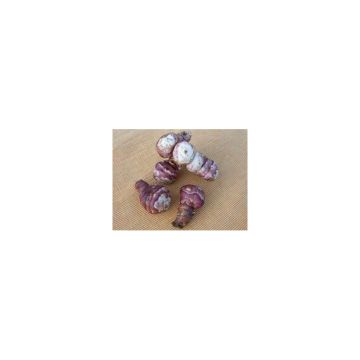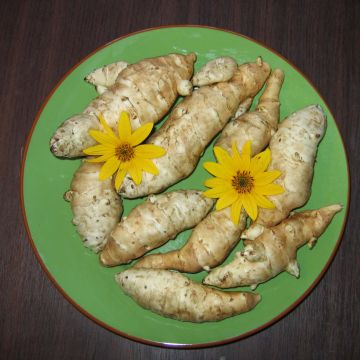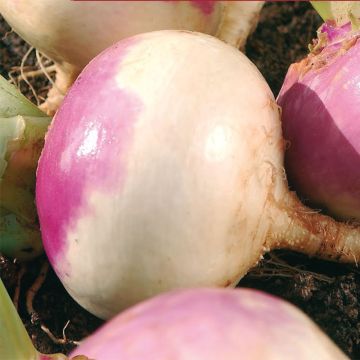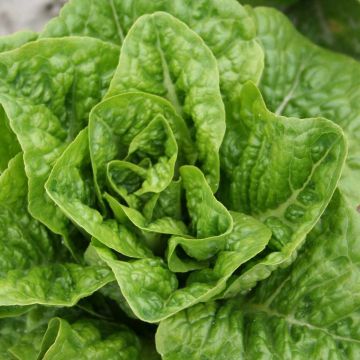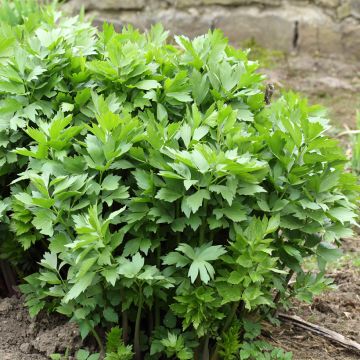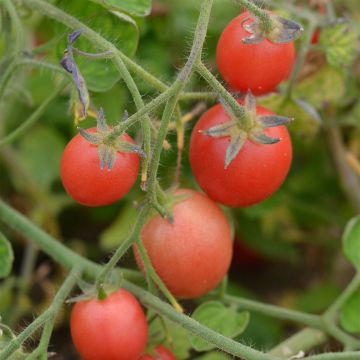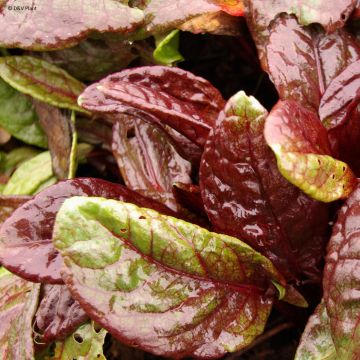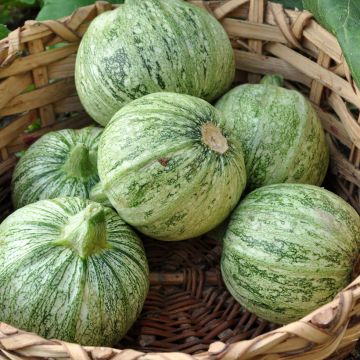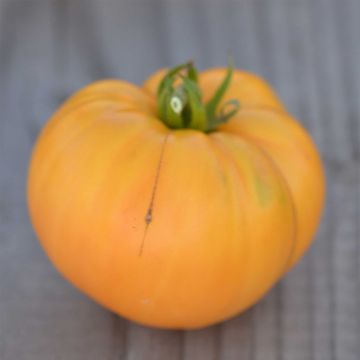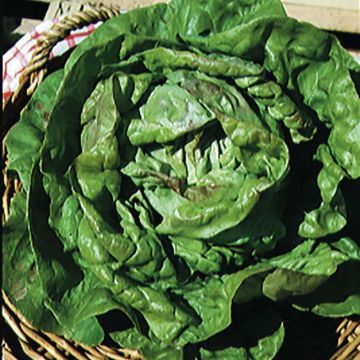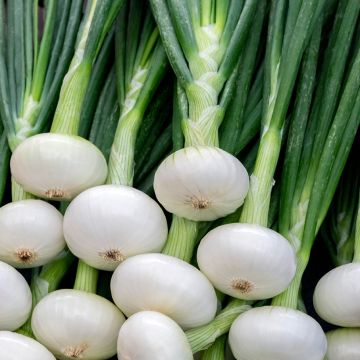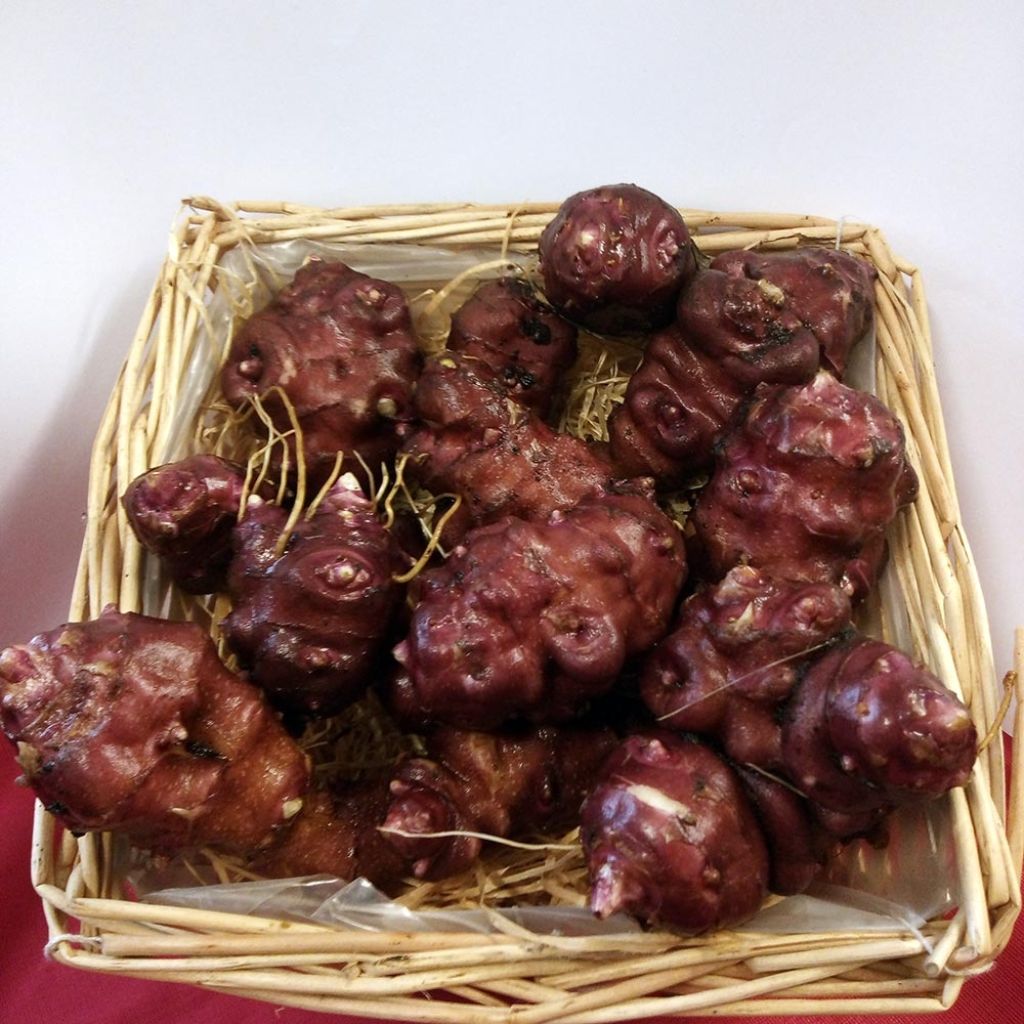

Topinambour Nain - Helianthus tuberosus
Dwarf Organic Jerusalem Artichoke - Helianthus tuberosus
Hélianthus tuberosus Nain
Jerusalem artichoke, sunroot, sunchoke, earth apple
This plant carries a 6 months recovery warranty
More information
We guarantee the quality of our plants for a full growing cycle, and will replace at our expense any plant that fails to recover under normal climatic and planting conditions.
From €5.90 for pickup delivery and €6.90 for home delivery
Express home delivery from €8.90.
Delivery to Corse prohibited: UE law prohibits the import of this plant from mainland France to Corse as part of the fight against Xylella fastidiosa. Please accept our sincere apologies.
More information
Description
The Dwarf Jerusalem Artichoke is a dwarf but productive variety that will not exceed 40 to 50 cm (16 to 20in) in height when in bloom, perfectly suited for cultivation in pots or in a small garden. This hardy perennial plant produces numerous edible tubers of irregular shape, with a reddish skin. Its flesh reveals a delicate flavor reminiscent of artichoke when cooked. This forgotten vegetable also charms with its golden yellow flowers similar to small sunflowers. Plant in spring or autumn for a harvest throughout winter, from November to March.
The Jerusalem Artichoke, in Latin Helianthus tuberosus, is cultivated for its elongated tubers, with a delicate flavor reminiscent of artichoke hearts. Like the sunflower, it belongs to the same species and the large family of Asteraceae. It is native to North America, where the indigenous people cultivated it long before the arrival of Europeans. At the end of summer, small sun-shaped flowers will appear. With its stems reaching about 45 cm (18in) in height, the dwarf Jerusalem artichoke is interesting to cultivate on balconies or terraces, as well as in summer flowerbeds. Choose carefully the location where you want to plant it. Indeed, this perennial plant spreads very quickly from the remains of tubers left after harvest. Therefore, precisely delimit the area where you want to cultivate it and remove any regrowth in the following spring if necessary.
Cooked and peeled, Jerusalem artichokes can be prepared like potatoes, in gratins, sautéed in a pan, or mashed. They can also be included in chicken broth, along with parsnips, carrots, and leeks. Consume them in small quantities as they can sometimes be difficult to digest. However, you can enjoy them throughout winter as they are one of the last vegetables to be harvested from the garden. The tubers contain numerous vitamins (A, C, and B3) as well as minerals such as potassium. They contain little starch, but another sugar called inulin, which is less digestible. However, the high fiber content of Jerusalem artichokes makes them beneficial for promoting intestinal transit. The young, rough leaves can also be consumed after cooking, as they have the same flavor as the tuber.
Harvesting: Dig up the tubers with a garden fork after the first frost, when the foliage has turned black. Very hardy, the Jerusalem artichoke can withstand frost and can therefore be harvested from November to March, as needed.
Storage: The tubers should be consumed quickly after harvest, within 2 to 3 days.
Gardener's Tip: We recommend mulching the soil with thin successive layers of grass clippings, if possible mixed with dead leaves. This protection, which keeps the soil moist, also reduces weed growth. In addition, a thick mulch will make harvesting easier during the winter period.
Report an error about the product description
Dwarf Organic Jerusalem Artichoke - Helianthus tuberosus in pictures
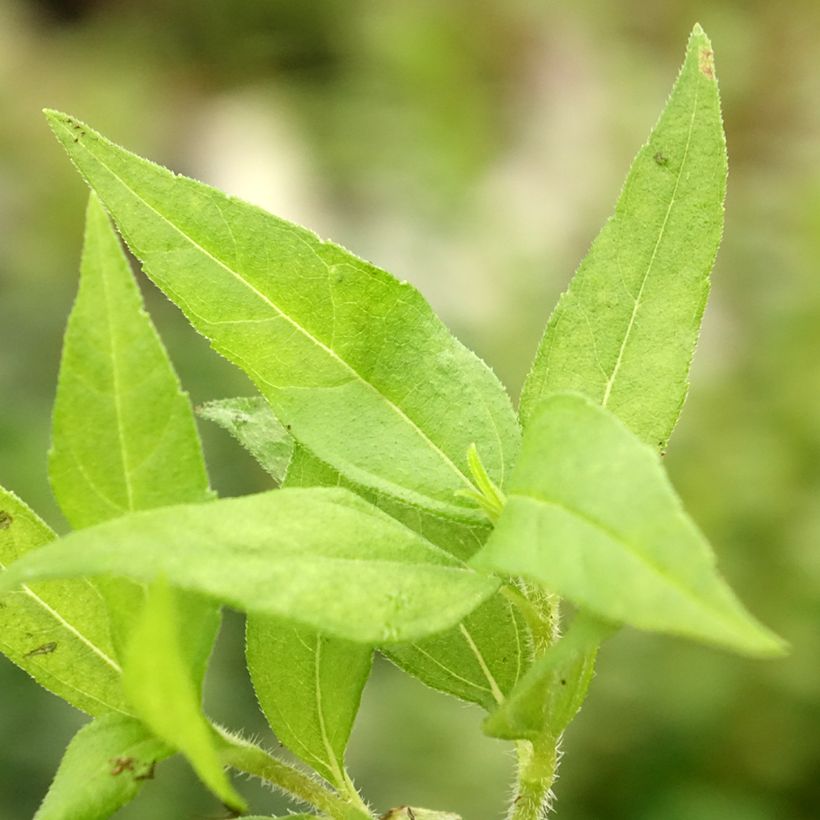

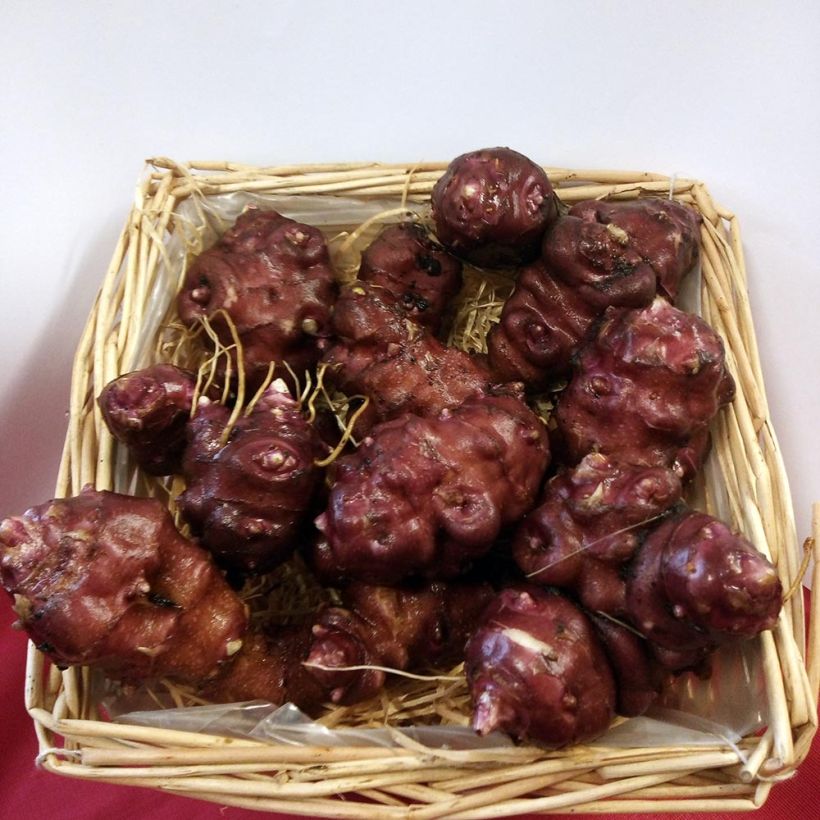

Harvest
Plant habit
Foliage
Other Jerusalem Artichokes
Planting and care
Planting of the Jerusalem artichoke is done in spring, from April to June, or in autumn in September - October. The Jerusalem artichoke thrives in most types of soil, with a preference for loose, fairly rich, and well-drained soil. It appreciates sunny exposures and sheltered areas. This dwarf variety can also be grown in a fairly large pot.
A few months before planting, enrich the soil with well-rotted compost, by scratching it to a depth of 5 cm (2in), after loosening the soil. The plants will be spaced 70 cm (28in) apart in all directions. Dig a hole (3 times the volume of the root ball), place the root ball and cover with soil. Firm and water.
Weed especially at the beginning of the cultivation. Mound up when the stem has developed and reaches 20 cm (8in).
Watering is not necessary, except in case of drought. Mulch the base in summer to maintain some freshness in case of prolonged drought.
You can install stakes to support the stems.
Cultivation
Care
Intended location
-
, onOrder confirmed
Reply from on Promesse de fleurs
Old and forgotten vegetables
Haven't found what you were looking for?
Hardiness is the lowest winter temperature a plant can endure without suffering serious damage or even dying. However, hardiness is affected by location (a sheltered area, such as a patio), protection (winter cover) and soil type (hardiness is improved by well-drained soil).

Photo Sharing Terms & Conditions
In order to encourage gardeners to interact and share their experiences, Promesse de fleurs offers various media enabling content to be uploaded onto its Site - in particular via the ‘Photo sharing’ module.
The User agrees to refrain from:
- Posting any content that is illegal, prejudicial, insulting, racist, inciteful to hatred, revisionist, contrary to public decency, that infringes on privacy or on the privacy rights of third parties, in particular the publicity rights of persons and goods, intellectual property rights, or the right to privacy.
- Submitting content on behalf of a third party;
- Impersonate the identity of a third party and/or publish any personal information about a third party;
In general, the User undertakes to refrain from any unethical behaviour.
All Content (in particular text, comments, files, images, photos, videos, creative works, etc.), which may be subject to property or intellectual property rights, image or other private rights, shall remain the property of the User, subject to the limited rights granted by the terms of the licence granted by Promesse de fleurs as stated below. Users are at liberty to publish or not to publish such Content on the Site, notably via the ‘Photo Sharing’ facility, and accept that this Content shall be made public and freely accessible, notably on the Internet.
Users further acknowledge, undertake to have ,and guarantee that they hold all necessary rights and permissions to publish such material on the Site, in particular with regard to the legislation in force pertaining to any privacy, property, intellectual property, image, or contractual rights, or rights of any other nature. By publishing such Content on the Site, Users acknowledge accepting full liability as publishers of the Content within the meaning of the law, and grant Promesse de fleurs, free of charge, an inclusive, worldwide licence for the said Content for the entire duration of its publication, including all reproduction, representation, up/downloading, displaying, performing, transmission, and storage rights.
Users also grant permission for their name to be linked to the Content and accept that this link may not always be made available.
By engaging in posting material, Users consent to their Content becoming automatically accessible on the Internet, in particular on other sites and/or blogs and/or web pages of the Promesse de fleurs site, including in particular social pages and the Promesse de fleurs catalogue.
Users may secure the removal of entrusted content free of charge by issuing a simple request via our contact form.
The flowering period indicated on our website applies to countries and regions located in USDA zone 8 (France, the United Kingdom, Ireland, the Netherlands, etc.)
It will vary according to where you live:
- In zones 9 to 10 (Italy, Spain, Greece, etc.), flowering will occur about 2 to 4 weeks earlier.
- In zones 6 to 7 (Germany, Poland, Slovenia, and lower mountainous regions), flowering will be delayed by 2 to 3 weeks.
- In zone 5 (Central Europe, Scandinavia), blooming will be delayed by 3 to 5 weeks.
In temperate climates, pruning of spring-flowering shrubs (forsythia, spireas, etc.) should be done just after flowering.
Pruning of summer-flowering shrubs (Indian Lilac, Perovskia, etc.) can be done in winter or spring.
In cold regions as well as with frost-sensitive plants, avoid pruning too early when severe frosts may still occur.
The planting period indicated on our website applies to countries and regions located in USDA zone 8 (France, United Kingdom, Ireland, Netherlands).
It will vary according to where you live:
- In Mediterranean zones (Marseille, Madrid, Milan, etc.), autumn and winter are the best planting periods.
- In continental zones (Strasbourg, Munich, Vienna, etc.), delay planting by 2 to 3 weeks in spring and bring it forward by 2 to 4 weeks in autumn.
- In mountainous regions (the Alps, Pyrenees, Carpathians, etc.), it is best to plant in late spring (May-June) or late summer (August-September).
The harvesting period indicated on our website applies to countries and regions in USDA zone 8 (France, England, Ireland, the Netherlands).
In colder areas (Scandinavia, Poland, Austria...) fruit and vegetable harvests are likely to be delayed by 3-4 weeks.
In warmer areas (Italy, Spain, Greece, etc.), harvesting will probably take place earlier, depending on weather conditions.
The sowing periods indicated on our website apply to countries and regions within USDA Zone 8 (France, UK, Ireland, Netherlands).
In colder areas (Scandinavia, Poland, Austria...), delay any outdoor sowing by 3-4 weeks, or sow under glass.
In warmer climes (Italy, Spain, Greece, etc.), bring outdoor sowing forward by a few weeks.

































